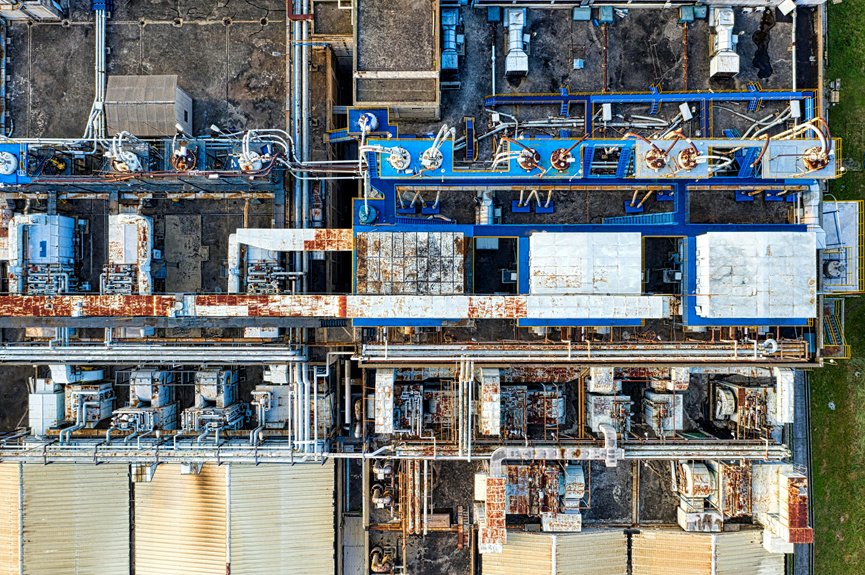When considering roofing options for your business, PVC roofing presents a mix of advantages and challenges worth evaluating carefully. Its durability and energy efficiency can save you money over time, but higher upfront costs and environmental factors could impact its performance. Understanding the true long-term value of PVC roofing requires a closer look at its lifespan, maintenance needs, and how it fits with your building’s specific conditions. Let’s explore whether it’s the right choice for your business.
Durability and Longevity of PVC Roofing
PVC roofing is renowned for its exceptional durability and long-lasting performance. You’ll appreciate how it withstands harsh weather, UV rays, and chemicals without deteriorating. Its resilience means fewer repairs and replacements over time, saving you money and hassle.
Plus, PVC roofs offer a wide range of color options, allowing you to customize your building’s look. The texture variety available lets you choose finishes that suit your aesthetic preferences, whether smooth or textured surfaces.
This combination of durability and aesthetic flexibility ensures your roof maintains its integrity and appeal for years. With proper maintenance, PVC roofing can last 20-30 years, making it a smart investment for your business’s structure and appearance.
Cost-Effectiveness and Installation Expenses
While PVC roofing offers impressive durability, its cost-effectiveness makes it an attractive choice for many businesses. When you consider the cost comparison, PVC roofing often proves more affordable than other materials due to its low maintenance needs and long lifespan.
Its material complexity allows for streamlined installation, which can reduce labor costs and installation time. Although the initial material costs might be slightly higher than simpler roofing options, the savings on repairs and replacements over time offset this expense.
Additionally, PVC’s lightweight nature makes it easier and quicker to install, further lowering overall installation expenses. Its experienced staff and focus on customer satisfaction ensure a smooth and efficient process from start to finish. Overall, PVC roofing combines reasonable upfront costs with long-term savings, making it a smart investment for your business.
Resistance to Weather and Environmental Factors
Because of their superior chemical composition, PVC roofing systems stand up well against harsh weather and environmental challenges. Their UV resistance helps prevent damage from prolonged sun exposure, reducing cracking and fading over time. This durability ensures your roof maintains its integrity and appearance longer.
Additionally, PVC roofs provide excellent wind resistance, allowing them to withstand strong gusts without lifting or tearing. The flexible yet tough material adapts to temperature fluctuations and storm conditions, offering reliable protection for your business.
This resilience minimizes the risk of leaks and structural damage caused by weather extremes. Overall, PVC roofing’s resistance to UV rays and wind makes it a smart choice for businesses seeking a durable, weather-resistant roofing solution that endures over time.
Ease of Maintenance and Repairs
Maintaining and repairing a PVC roofing system is straightforward, thanks to its seamless, monolithic design. This design minimizes the number of seams, reducing potential leak points and making cleaning requirements simpler. Regular inspections help spot minor issues early, preventing costly repairs down the line.
Cleaning is generally easy; you can use mild detergents and water to remove dirt and debris effectively. When repairs are needed, the process tends to be less complex compared to other roofing types because PVC sheets are durable and easily bonded with compatible adhesives.
This ease of maintenance means you spend less time and money on upkeep, keeping your roof in good shape without extensive effort. Overall, PVC roofing offers practical benefits for local businesses seeking manageable, cost-effective roof maintenance.
Energy Efficiency and Reflectivity Benefits
Have you considered how a PVC roofing system can help reduce your energy costs? Its high reflectivity means it bounces back sunlight, keeping your building cooler and lowering cooling expenses.
PVC roofs also enhance thermal insulation, preventing heat transfer in both summer and winter, which maintains a consistent indoor temperature. This improved insulation reduces the strain on your HVAC system, saving you money.
Additionally, PVC roofing offers noise reduction benefits, dampening external sounds such as rain or hail, creating a quieter indoor environment.
These energy efficiency features not only cut operational costs but also contribute to a more comfortable workspace. Choosing PVC roofing means investing in a solution that actively supports your business’s sustainability goals while lowering long-term energy expenses.
Environmental Impact and Sustainability
By choosing a PVC roofing system, you’re also making an environmentally responsible decision. PVC is often part of recycling programs, allowing your old roof to be repurposed rather than discarded. This reduces landfill waste and minimizes environmental impact.
Additionally, PVC roofing uses eco friendly materials, which are designed to have a lower carbon footprint during production. Many manufacturers prioritize sustainability by sourcing materials responsibly and incorporating recycled content.
PVC roofs are durable, meaning fewer replacements over time, which further supports environmental goals. While some concerns exist about plastic production, the overall lifecycle benefits—like recyclability and longevity—make PVC a more sustainable choice for your business.
Making informed decisions today helps promote a greener future for your community and the planet.
Aesthetic Options and Customization
PVC roofing offers a wide range of aesthetic options and customization choices that can enhance your building’s appearance. With numerous color options available, you can select shades that match your branding or complement your surroundings. This flexibility allows you to create a distinctive look that sets your business apart.
Additionally, PVC roofing provides excellent design flexibility, enabling you to incorporate unique shapes, patterns, or roof features tailored to your needs. Whether you prefer a sleek, modern look or a more traditional style, PVC roofing can be tailored to fit your vision.
This adaptability ensures your roof not only protects your property but also contributes positively to your overall building aesthetic.
Potential Chemical and UV Damage
While PVC roofing offers impressive aesthetic flexibility, it’s important to contemplate how environmental factors can impact its longevity. Chemical degradation can occur if the roof comes into contact with harsh chemicals or pollutants, weakening the material over time.
UV exposure from sunlight accelerates this process, causing the PVC to become brittle, crack, or fade. Prolonged UV exposure can lead to surface deterioration, reducing the roof’s effectiveness and lifespan.
To combat this, many PVC roofs include UV stabilizers, but extreme conditions still pose risks. You should regularly inspect your roof for signs of chemical or UV damage, especially in areas with high pollution or intense sunlight.
Proper maintenance and protective coatings can help mitigate these effects, extending your roof’s durability.
Compatibility With Existing Structures
Ensuring that a PVC roofing system integrates seamlessly with your existing structure is essential for a successful installation. You need to verify that it meets building code compliance to avoid legal issues and guarantee safety standards are met.
PVC roofing typically adapts well to various structures, but you should assess your current roof’s design and materials. Proper compatibility helps prevent leaks, structural stress, and installation delays.
Additionally, aesthetic integration matters; PVC roofs come in different colors and finishes that can complement your building’s look.
When planning your upgrade, consult with professionals to evaluate your building’s specifics and guarantee the new roof aligns with both safety regulations and your visual preferences. This proactive approach guarantees a smooth transition and a durable, attractive result.
Overall Lifespan and Replacement Considerations
Have you considered how long a PVC roofing system is expected to last and what factors might influence its lifespan? On average, PVC roofs last 20 to 30 years with proper maintenance.
However, installation challenges can impact longevity, so professional, experienced installers are essential to avoid early failures. Your warranty considerations also play a role; a robust warranty provides peace of mind and covers repairs or replacements if issues arise prematurely.
Keep in mind that certain environmental factors, like UV exposure and severe weather, can accelerate wear. Regular inspections and maintenance can extend your roof’s lifespan, but eventually, replacement becomes necessary.
Planning for this ensures minimal disruption to your business operations and helps you budget effectively for the future.
Conclusion
PVC roofing provides your business with durable, energy-efficient protection that can last 20-30 years with proper maintenance. Although initial costs may be higher, its excellent resistance to weather conditions and ease of upkeep make it a smart investment. To ensure maximum lifespan, be sure to schedule regular inspections and professional installations. For more information on how to schedule your free roof inspection, call us at (405) 543-2920 or visit us online at Top View Roofing. With careful planning, PVC roofing offers a long-lasting, eco-friendly solution that safeguards your investment and ensures reliable protection for years to come.


















